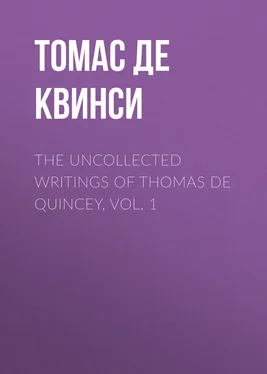Томас Де Квинси - The Uncollected Writings of Thomas de Quincey, Vol. 1
Здесь есть возможность читать онлайн «Томас Де Квинси - The Uncollected Writings of Thomas de Quincey, Vol. 1» — ознакомительный отрывок электронной книги совершенно бесплатно, а после прочтения отрывка купить полную версию. В некоторых случаях можно слушать аудио, скачать через торрент в формате fb2 и присутствует краткое содержание. Жанр: foreign_prose, literature_19, foreign_antique, на английском языке. Описание произведения, (предисловие) а так же отзывы посетителей доступны на портале библиотеки ЛибКат.
- Название:The Uncollected Writings of Thomas de Quincey, Vol. 1
- Автор:
- Жанр:
- Год:неизвестен
- ISBN:нет данных
- Рейтинг книги:4 / 5. Голосов: 1
-
Избранное:Добавить в избранное
- Отзывы:
-
Ваша оценка:
- 80
- 1
- 2
- 3
- 4
- 5
The Uncollected Writings of Thomas de Quincey, Vol. 1: краткое содержание, описание и аннотация
Предлагаем к чтению аннотацию, описание, краткое содержание или предисловие (зависит от того, что написал сам автор книги «The Uncollected Writings of Thomas de Quincey, Vol. 1»). Если вы не нашли необходимую информацию о книге — напишите в комментариях, мы постараемся отыскать её.
The Uncollected Writings of Thomas de Quincey, Vol. 1 — читать онлайн ознакомительный отрывок
Ниже представлен текст книги, разбитый по страницам. Система сохранения места последней прочитанной страницы, позволяет с удобством читать онлайн бесплатно книгу «The Uncollected Writings of Thomas de Quincey, Vol. 1», без необходимости каждый раз заново искать на чём Вы остановились. Поставьте закладку, и сможете в любой момент перейти на страницу, на которой закончили чтение.
Интервал:
Закладка:
Конец ознакомительного фрагмента.
Текст предоставлен ООО «ЛитРес».
Прочитайте эту книгу целиком, купив полную легальную версию на ЛитРес.
Безопасно оплатить книгу можно банковской картой Visa, MasterCard, Maestro, со счета мобильного телефона, с платежного терминала, в салоне МТС или Связной, через PayPal, WebMoney, Яндекс.Деньги, QIWI Кошелек, бонусными картами или другим удобным Вам способом.
1
De Quincey, Leigh Hunt, and Macaulay all died in that year.
2
This incident was a complicated contention, concerning the copyright of The Confessions , in which De Quincey had long allowed his rights to lie dormant. It was at last happily settled in an amicable manner.
3
Objectively and subjectively are terms somewhat too metaphysical; but they are so indispensable to accurate thinking that we are inclined to show them some indulgence; and, the more so, in cases where the mere position and connection of the words are half sufficient to explain their application.
4
In general usage, ' The antique ' is a phrase limited to the expression of art; but improperly so. It is quite as legitimately used to denote the literature of ancient times, in contradistinction to the modern. As to the term classical , though generally employed as equivalent to Greek and Roman, the reader must not forget this is quite a false limitation, contradicting the very reason for applying the word in any sense to literature. For the application arose thus: The social body of Rome being divided into six classes, of which the lowest was the sixth, it followed that the highest was the first. Thence, by a natural process common to most languages, those who belonged to this highest had no number at all assigned to them. The very absence of a number, the calling them classici , implied that they belonged to the class emphatically, or par excellence . The classics meant, therefore, the grandees in social consideration; and thence by analogy in literature. But if this analogy be transferred from Rome to Greece, where it had no corresponding root in civic arrangement—then, by parity of reason, to all nations.
5
The beauty of this famous epigram lies in the form of the conception. The first had A; the second had B; and when nature, to furnish out a third, should have given him C, she found that A and B had already exhausted her cycle; and that she could distinguish her third great favourite only by giving him both A and B in combination. But the filling up of this outline is imperfect: for the A ( loftiness ) and the B ( majesty ) are one and the same quality, under different names.
6
Because the Latin word sublimis is applied to objects soaring upwards, or floating aloft, or at an aerial altitude, and because the word does sometimes correspond to our idea of the sublime (in which the notion of height is united with the notion of moral grandeur), and because, in the excessive vagueness and lawless latitudinarianism of our common Greek Lexicons, the word ὑψος is translated, inter alia , by το sublime , sublimitas , &c. Hence it has happened that the title of the little essay ascribed to Longinus, Περι ὑψους, is usually rendered into English, Concerning the sublime . But the idea of the Sublime, as defined, circumscribed, and circumstantiated, in English literature—an idea altogether of English growth—the sublime byway of polar antithesis to the Beautiful , had no existence amongst ancient critics; consequently it could have no expression. It is a great thought, a true thought, a demonstrable thought, that the Sublime, as thus ascertained, and in contraposition to the Beautiful, grew up on the basis of sexual distinctions, the Sublime corresponding to the male, the Beautiful, its anti-pole, corresponding to the female. Behold! we show you a mystery.
7
No word has ever given so much trouble to modern critics as this very word (now under discussion) of the sublime . To those who have little Greek and no Latin, it is necessary in the first place that we should state what are the most obvious elements of the word. According to the noble army of etymologists, they are these two Latin words— sub , under, and limus , mud. Oh! gemini! who would have thought of groping for the sublime in such a situation as that?—unless, indeed, it were that writer cited by Mr. Coleridge, and just now referred to by ourselves, who complains of frivolous modern readers, as not being able to raise and sequester their thoughts to the abstract consideration of dung. Hence it has followed, that most people have quarrelled with the etymology. "Whereupon the late Dr. Parr, of pedantic memory, wrote a huge letter to Mr. Dugald Stewart, but the marrow of which lies in a nutshell, especially being rather hollow within. The learned doctor, in the first folio, grapples with the word sub , which, says he, comes from the Greek—so much is clear—but from what Greek, Bezonian? The thoughtless world, says he, trace it to ὑπο (hypo), sub, i. e. under; but I, Ego, Samuel Parr, the Birmingham doctor, trace it to ὑπερ (hyper), super, i. e. above; between which the difference is not less than between a chestnut horse and a horse-chestnut. To this learned Parrian dissertation on mud, there cannot be much reasonably to object, except its length in the first place; and, secondly, that we ourselves exceedingly doubt the common interpretation of limus . Most unquestionably, if the sublime is to be brought into any relation at all to mud, we shall all be of one mind—that it must be found above . But to us it appears—that when the true modern idea of mud was in view, limus was not the word used. Cicero, for instance, when he wishes to call Piso 'filth, mud,' &c. calls him Cænum : and, in general, limus seems to have involved the notion of something adhesive, and rather to express plaister , or artificially prepared cement, &c., than that of filth or impure depositions. Accordingly, our own definition differs from the Parrian, or Birmingham definition; and may, nevertheless, be a Birmingham definition also. Not having room to defend it, for the present we forbear to state it.
8
There is a difficulty in assigning any term as comprehensive enough to describe the Grecian heroes and their antagonists, who fought at Troy. The seven chieftains against Thebes are described sufficiently as Theban captains; but, to say Trojan chieftains, would express only the heroes of one side; Grecian , again, would be liable to that fault equally, and to another far greater, of being under no limitation as to time. This difficulty must explain and (if it can) justify our collective phrase of the Paladins of the Troad.
9
'To his own knowledge'—see, for proof of this, the gloomy serenity of his answer to his dying victim, when, predicting his approaching end:—
'Enough; I know my fate: to die—to see no more
My much-lov'd parents, and my native shore,' &c. &c.
Интервал:
Закладка:
Похожие книги на «The Uncollected Writings of Thomas de Quincey, Vol. 1»
Представляем Вашему вниманию похожие книги на «The Uncollected Writings of Thomas de Quincey, Vol. 1» списком для выбора. Мы отобрали схожую по названию и смыслу литературу в надежде предоставить читателям больше вариантов отыскать новые, интересные, ещё непрочитанные произведения.
Обсуждение, отзывы о книге «The Uncollected Writings of Thomas de Quincey, Vol. 1» и просто собственные мнения читателей. Оставьте ваши комментарии, напишите, что Вы думаете о произведении, его смысле или главных героях. Укажите что конкретно понравилось, а что нет, и почему Вы так считаете.












